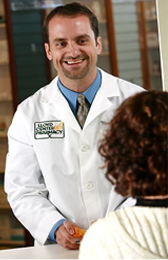 Pharmacy compounding is the art and science of preparing customized medications for patients. Its practice dates back to the origins of pharmacy, although compounding’s presence in the pharmacy profession has changed over the years. In the 1930s and ’40s, the majority of prescriptions were compounded. With the advent of mass drug manufacturing in the 1950s and ‘60s, compounding declined as the pharmacist’s role as a preparer of medications quickly changed to that of a dispenser of manufactured dosage forms. However, this “one-size-fits-all” approach to medication meant that some patients’ needs were not being met. Within the last few decades, however, compounding has experienced a renaissance as modern technology and innovative techniques and research have allowed more pharmacists to customize medications to meet a patient’s unique needs.
Pharmacy compounding is the art and science of preparing customized medications for patients. Its practice dates back to the origins of pharmacy, although compounding’s presence in the pharmacy profession has changed over the years. In the 1930s and ’40s, the majority of prescriptions were compounded. With the advent of mass drug manufacturing in the 1950s and ‘60s, compounding declined as the pharmacist’s role as a preparer of medications quickly changed to that of a dispenser of manufactured dosage forms. However, this “one-size-fits-all” approach to medication meant that some patients’ needs were not being met. Within the last few decades, however, compounding has experienced a renaissance as modern technology and innovative techniques and research have allowed more pharmacists to customize medications to meet a patient’s unique needs.
What kinds of prescriptions can be compounded?
Almost any kind! Compounded prescriptions are ideal for any patient requiring unique dosages and/or delivery devices.
Compounding applications can include:
- Hormone replacement therapy (HRT)
- Hospice
- Pediatrics
- Pain management
- Ophthalmology
- Dentistry
- Otic (for the ear)
- Dermatology
- Medication flavoring
- Neuropathy
- Veterinary
- Sports medicine
- Infertility
- Wound therapy
- Podiatry
- Gastroenterology
- And many more!
Unique medication delivery to meet patients’ needs
Compounding enables prescribers and pharmacists to meet the special needs of patients. One of its most important benefits is to those patients who have difficulties with commercially available medication. With the prescriber’s authorization, pharmacists can custom-prepare medications in a variety of unique dosage forms, including:
- Capsules
- Oral liquids
- Troches or lollipops
- Topical preparations
- Suppositories
- Eye and ear drops
- Nasal sprays
- Sterile injections
How does compounding benefit patients?
 There are several reasons why prescribers and pharmacists provide compounded medications for patients. The primary reason for compounding is to avoid patient non-compliance, which means the patient is either unable or unwilling to use the medication as directed. Many patients are allergic to preservatives or dyes, or require a dosage that is different from the standard drug strengths.
There are several reasons why prescribers and pharmacists provide compounded medications for patients. The primary reason for compounding is to avoid patient non-compliance, which means the patient is either unable or unwilling to use the medication as directed. Many patients are allergic to preservatives or dyes, or require a dosage that is different from the standard drug strengths.
With a physician’s consent, a compounding pharmacist can:
- Adjust the strength of a medication
- Avoid unwanted ingredients, such as dyes, preservative, lactose, gluten, or sugar.
- Add flavor to make the medication more palatable
- Prepare medications using unique delivery systems. For patients who find it difficult to swallow a capsule, a compounding pharmacist may prepare the drug as a flavored liquid suspension instead. Other medication forms include topical gels or creams that can be absorbed through the skin, suppositories, sublingual troches, or even lollipops.
Can a child – or an elderly patient – take compounded medication?
Yes! Children and the elderly are often the types of patients who benefit most from compounding. It is common for parents to have a tough time getting their children to take medicine because of the taste. A compounding pharmacist can work directly with the physician and the patient to select a flavoring agent, such as bubblegum, grape, tutti frutti, or vanilla butternut, which provides both an appropriate match for the medication’s properties and the patient’s taste preferences. Just think – no more wasting medicine when a cranky patient spits it out!
Compounding pharmacists also can help patients who experience chronic pain. For example, some arthritic patients cannot take certain medications due to gastrointestinal side effects. With a healthcare practitioner’s prescription, a compounding pharmacist may be able to provide these patients’ anti-inflammatory or pain-relieving medications with topical preparations that can be absorbed through the skin. Compounded prescriptions frequently are used to ease pain, nausea, and other symptoms for hospice patients as well.
Is compounding legal? Is it safe?
Compounding has been part of healthcare since the origins of pharmacy, and is widely used today in all areas of the industry, from hospitals to nuclear medicine. Over the last few decades, compounding’s resurgence has benefited largely from advances in technology, quality control and research methodology. The Food and Drug Administration has stated that compounded prescriptions are both ethical and legal as long as they are prescribed by a licensed practitioner for a specific patient and compounded by a licensed pharmacy. In addition, compounding is regulated by state boards of pharmacy.
Compounding For Drug Shortages
The growing drug shortage problem is impacting a range of patient conditions and issues from oral antibiotics that allow pediatric and elderly patients unable to swallow pills to take their medicine, to treatments for leukemia and chemotherapy, to name just a few. Recently, the American Society of Health-System Pharmacists (ASHP) named over 200 medicines on its drug shortage list. During a recent FDA-sponsored forum on drug shortages, a representative from the Drug Information Resource Center (DIRC) reported tracking 210 “new” shortages over the first nine months of 2011, with more than 260 cumulative shortages, new and ongoing.
Compounding pharmacists play an important role in providing access to discontinued medications and drugs in short supply by compounding the specific drug—based on a physician’s prescription, using pharmaceutical base ingredients to help ensure that patients get the critical care they require.
Pharmacists at PersonalMed network pharmacies have access to the highest quality pharmaceutical ingredients, and can fulfill a prescription using the latest research, quality control processes, and testing technologies to create compounded medications that meet the individual needs of patients.
To learn more about how compounding can integrated into your current employee benefit and/or plan design please fill out this form to get started.
